-
Comments on Proposed Repeal of the Clean Power Plan
As the Environmental Protection Agency (EPA) continues its rulemaking to repeal the Clean Power Plan, we submitted two sets of comments that challenge EPA’s legal and economic arguments for undoing this important climate policy.
-

Managing the Future of Energy Storage
Implications for Greenhouse Gas Emissions
Many policymakers assume that increasing deployment of energy storage will automatically reduce greenhouse gas emissions, in part by helping to integrate renewable energy resources with intermittent and variable generation. This report, published in the Harvard Environmental Law Review, explores situations in which energy storage systems can in fact lead to increased emissions, and offers reforms to correct for poor incentives while ensuring that energy storage can provide the maximum benefit possible to the grid.
-
Comments on EPA’s Failure to Monetize Forgone Emission Reductions in CTG Withdrawal
EPA is soliciting comments on the proposed withdrawal of its control techniques guidelines (CTG) for the oil and natural gas industry. EPA supports its proposed withdrawal of the CTG with an analytical memorandum on avoided costs and forgone emission reductions. The agency monetizes the alleged avoided costs down to the dollar, but EPA fails to monetize the forgone emission reductions. Our joint comments illustrate how the proposed withdrawal’s costs outweigh its benefits, by applying the Social Cost of Methane to EPA’s quantified foregone emissions reductions. We argue that by only quantifying the volume of forgone methane reductions, instead of monetizing the associated damages to the environment, public health, and welfare, EPA obscures the very real and readily monetizable negative consequences of its proposed withdrawal.
-
Comments to OSMRE on Failure to Use the Social Cost of Greenhouse Gases in a Federal Mining Plan
We recently submitted comments to Office of Surfacing Mining Reclamation and Enforcement (OSM) on its environmental assessment (EA) on modifying the federal mining plan for Bull Mountains Mine No. 1 in Montana. The EA evaluates a proposal to extend operations at an existing mine by nine years, which would produce an extra 86.7 million tons of coal. While the EA quantifies the tons of greenhouse gas emissions related to the project, OSM refused to use the social cost of greenhouse gases metric to monetize the climate effects of these emissions. Our comments explain why the agency’s refusal is arbitrary and unlawful in light of a growing body of case law, which holds that failure to monetize a project’s costs is impermissible if an agency justifies an action based on the project’s monetized benefits. Our comments also explain why the social cost of greenhouse gases metric is appropriate for projects of this scale, why the metric’s use is not limited to rulemakings, and how failing to adequately account for the project’s climate effects is a violation of NEPA.
-
Comments to FERC on Failure to Monetize Climate Effects of Riverdale Gas Pipeline
We recently submitted comments to the Federal Energy Regulatory Commission on its environmental assessment (EA) for the Rivervale South to Market pipeline project in New Jersey. Once again, FERC quantified the tons of downstream greenhouse gas emissions that the project would generate, but the Commission did not use the social cost of greenhouse gases to monetize the climate effects of those emissions. In the EA, FERC incorrectly claims that it is impossible to determine the significance of a discrete amount of additional greenhouse gas emissions. Our comments dispel FERC’s arbitrary and misleading rationale and explain why failing to meaningfully analyze a project’s climate effects violates NEPA. Our comments also offer guidance for how the Commission should use the social cost of greenhouse gases metric based on the best available science and economics going forward.
-
Comments on California’s Distributed Energy Resources Policy
The California Public Utilities Commission (CPUC) is developing a comprehensive policy for integrating Distributed Energy Resource (DERs), like rooftop solar, into its energy system. A March 2018 administrative law judge ruling heavily cited our earlier comments in laying out a revised plan to require the state’s utilities to conduct a societal cost test to help compare the net benefits of different DER technologies. We submitted comments to the CPUC commending the agency for its revisions to the proposed analysis and recommending additional improvements.
-

Environmental Standards, Thresholds, and the Next Battleground of Climate Change Regulations
Regulations to curtail climate change have the additional benefit of reducing air pollution by accelerating the shift away from carbon-intensive and high-polluting energy such as coal. The benefits from reducing just one air pollutant – particulate matter – account for almost half of the quantified benefits of the Obama Administration’s Clean Power Plan. Regulatory opponents have launched an aggressive attack on the use of these benefits to justify climate change regulations. They claim that these benefits are not real, are accounted for in other regulations, or should not be considered because they are indirect benefits. This article, published in the Minnesota Law Review, collects and analyzes for the first time the robust support for valuing particulate matter and other air pollution reduction benefits. Following an examination of the scientific literature, longstanding agency practices under administrations of both major political parties, and judicial precedent, the authors conclude that particulate matter benefits deserve a meaningful role in regulatory cost-benefit analysis.
-
Comments to Virginia on Its Proposal to Join the Regional Greenhouse Gas Initiative
The State of Virginia is proposing to join the Regional Greenhouse Gas Initiative (RGGI), a carbon trading program currently including states across the Northeastern U.S. Including Virginia energy producers in RGGI will greatly expand the scope of the carbon market, thereby improving market efficiency, competitiveness, and lowering carbon abatement costs. Our comments to Virginia on its proposal offer two suggestions to ensure that Virginia’s addition to RGGI creates a competitive permit trading market.
-
Joint Comments on the Midcontinent Supply Header Interstate Pipeline
We recently submitted joint comments with EDF and Sierra Club to the Federal Energy Regulatory Commission on the draft environmental impact statement (DEIS) for the Midcontinent Supply Header Interstate Pipeline. The analysis covers a proposal to construct over 200 miles of pipeline, as well as compressor stations, a booster station, and accompanying facilities, to transport natural gas. The DEIS quantifies the tons of downstream greenhouse gas emissions related to this project—over 28 million metric tons of carbon dioxide per year—but FERC fails to use the social cost of greenhouse gases metric to fully account for the climate effects of these emissions. FERC’s failure to adequately consider climate damages from the pipelines it approves is under increasing scrutiny. Our comments offer a detailed rejection of FERC’s rationale for excluding the social cost of greenhouse gases from this analysis, and give FERC additional guidance on how to monetize climate effects consistent with the currently best available science and economics.
-
Amicus Brief on New York’s Zero Emissions Credits and the Social Cost of Carbon
In 2016, the New York Public Service Commission adopted the Clean Energy Standard, an ambitious plan to increase renewable generation to 50% of the market by 2030. While working toward that goal, the State found it was necessary to pay nuclear generators through a zero-emissions credits (ZECs) system, as compensation for the value they provide in avoiding emissions. The State found that this would help guard against an increase in pollution if the nuclear generators were to close. Our amicus brief to the Supreme Court of New York in Albany County argues that the Commission’s decision to base ZEC prices on the Social Cost of Carbon (SCC) was reasonable.
Viewing recent projects in Climate and Energy Policy



